

AUGUST • VOL. 8 • SERIES OF 2022
INSIGHTS is a monthly publication of BDB LAW to inform, update and provide perspectives to our clients and readers on significant tax-related court decisions and regulatory issuances (includes BIR, SEC, BSP, and various government agencies).

DISCLAIMER: The contents of this Insights are summaries of selected issuances from various government agencies, Court decisions, and articles written by our experts. They are intended for guidance only and as such should not be regarded as a substitute for professional advice.
Copyright © 2022 by Du-Baladad and Associates (BDB Law). All rights reserved. No part of this issue covered by this copyright may be produced and/or used in any form or by any means – graphic, electronic, and mechanical without the written permission of the publisher.
What's Inside ...
- HIGHLIGHTS FOR AUGUST 2022
- SIGNIFICANT COURT DECISIONS
- Supreme Court
- Court of Tax Appeals
- SIGNIFICANT REGULATORY ISSUANCES
- Bureau of Internal Revenue
- Bangko Sentral Ng Pilipinas
- Insurance Commission
- Bureau of Customs
- Fiscal Incentives Review Board
- PUBLISHED ARTICLE
- 180-Day Period on Tax Assessment
- OUR EXPERTS
- The Personalities
- The Personalities


HIGHLIGHTS for AUGUST 2022
COURT DECISIONS
- Enforcement of collection remedies pending appeal with the CIR is void and should be of no force and effect. (Light Rail Transit Authority v. Bureau of Internal Revenue, G.R. No. 231238, June 20, 2022)
- Section 246 of the Tax Code prohibits retroactive application of a reversal of BIR Ruling if the same would be prejudicial to the taxpayer unless the exception applies. (Commissioner of Internal Revenue vs. Meridien East Realty & Development Corporation, CTA EB No. 2287 (CTA Case No. 9130), July 14, 2022)
- Submission of the service agreement is material in proving that the services rendered qualify for VAT zero-rating under Section 108(B)(2) of the Tax Code, as amended. (Ammex I-Support Corporation v Commissioner of Internal Revenue, CTA Case No. 9773, July 14, 2022)
- For the presumption of correctness of assessment to apply, the assessment must be based on fact. (CIR v. Iconic Beverages, Inc., CTA EB No. 2345 (CTA Case No. 9657), July 21, 2022)
BIR ISSUANCES
- RMC No. 102-2022, July 14, 2022 – This publishes Fiscal Incentives Review Board Resolution No. 017-22 - grant of authority to implement a 70:30 Work-From-Home arrangement for Registered Business Enterprises in the Information Technology – Business Process Management Sector.
- RMC No. 111-2022, July 14, 2022 – This publishes the full text of Executive Order No. 170 titled “Adoption of Digital Payments for Government Disbursements and Collections.”
- RMC No. 115-2022, July 14, 2022 – This lifts the suspension on the issuance of Mission Orders for the conduct of Tax Compliance Verification Drive (TCVD).
- BIR Ruling NSH-351-2022, July 14, 2022 – The process of converting renewable sources into power is a continuing process and may continue even during the commercial operations as long as there is a renewable energy being converted into power. Necessarily, local purchases incurred during this stage remains to be entitled to VAT zero-rating.
- BIR Ruling NSH-352-2022, July 14, 2022 – A homeowner association is not among those in whose favor donation or gifts made are exempt under the law.
BSP ISSUANCES
- BSP Circular Letter No. CL-2022-054, July 8, 2022 – This provides the Financial Action Task Force (FATF) publications on High Risk and Other Monitored Jurisdictions for June 2022.
IC ISSUANCES
- IC Circular Letter CL-2022-34, July 14, 2022 – This provides the guidelines on the adoption of the revised scheduled of minimum catastrophe rates.
- IC Circular Letter CL-2022-36, July 18, 2022 – This requires the submission of status reports and additional disclosures in the financial statements relative to IFRS 17 insurance contracts.
BOC ISSUANCES
- CMO No. 19-2022, July 5, 2022 – This provides for the implementation of the Electronic Zone Transfer System (E-ZTS) for the Inter-Zone Transfer of Goods Between PEZA-Registered Enterprises (PREs).
FIRB ISSUANCES
- FIRB Resolution No. 020-22, June 21, 2022 – This provides for the extension of the deadline for submission of the Annual Tax Incentive Report (ATIR) and Annual Benefits Report (ABR) for all Registered Business Enterprises (RBEs) and Investment Promotion Agencies (IPAs).

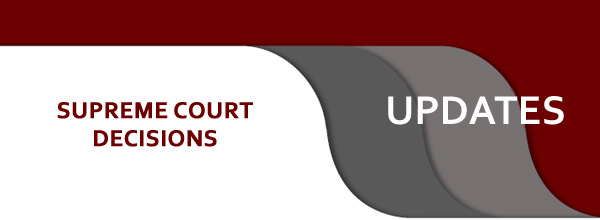
Enforcement of collection remedies pending appeal with the CIR is void and should be of no force and effect.
Subsection 3.1.5 of Revenue Regulations No. 12-99 is clear that if the protest is elevated to the Commissioner of Internal Revenue (CIR), "the latter's decision shall not be considered final, executory and demandable, in which case, the protest shall be decided by the Commissioner.
The issuance therefore of a Preliminary Collection Letter, the Final Notice Before Seizure, and the Warrant of Distraint and/or Levy pending appeal with the Commissioner of Internal Revenue shall not be considered a decision of the latter. More importantly, all of these were issued on the premise that "delinquent taxes" exist, an incorrect premise.
Thus, the enforcement of collection remedies denying the request for reconsideration all emanated from a non-demandable assessment. As such, all were void and should be of no force and effect. (Light Rail Transit Authority v. Bureau of Internal Revenue, G.R. No. 231238, June 20, 2022)
Association dues, membership fees, and other assessments or charges are not subject to income tax, Value-Added Tax, and withholding tax.
The CIR gravely abused its authority in issuing Revised Memorandum Circular No. 65, and that in doing so, the Circular did not merely interpret or clarify but changed altogether the long-standing rules of the Bureau of Internal Revenue (BIR).
Here, this Court likewise declared that the CIR gravely abused its discretion in issuing the same Circular and for declaring that association dues, membership fees, and other assessments or charges are subject to income tax, Value-Added Tax, and withholding tax.
This Court reiterated the pronouncement in Yamane v. BA Lepanto Condominium Corporation, that a condominium corporation is not engaged in trade or business. Association dues are not intended for profit, but for the maintenance of the condominium project. The collection of association dues, membership fees, and other charges is purely for the benefit of the condominium owners. (Fritz Bryn Anthony M. Delos Santos v. Commissioner of Internal Revenue, G.R. No. 222548, June 22, 2022)

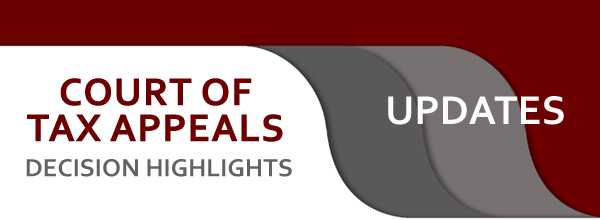
For purposes of VAT zero-rating under Section 108(B)(2) of the Tax Code, the non-resident foreign corporation must prove that (1) it is not a domestic corporation; and (2) it is not engaged in trade or business in the Philippines.
In this case, the taxpayer failed to submit competent evidence that its clients are nonresident foreign corporations doing business outside the Philippines. The taxpayer presented “foreign business registration printouts.” However, in lieu of submitting duly authenticated proof of official foreign record, the taxpayer submitted mere printouts thereof, retrieved from AMINET database.
The Court partially denied the taxpayer’s claim for refund of unutilized input VAT for the first quarter of CY 2017. The Court held that for purposes of VAT zero-rating under Section 108(B)(2) of the Tax Code, the claimant must establish the two components of its client’s status as a non-resident foreign corporation, namely: (1) it is not a domestic corporation; and (2) it is not engaged in trade or business in the Philippines.
Thus, failure to present proof of the second element, i.e., that the affiliate is not doing business in the Philippines, is fatal to its claim for refund. Taxpayers are not precluded from adducing other competent evidence to prove an entity’s status as a non-resident foreign corporation. (Commissioner of Internal Revenue v Deutsche Knowledge Services, CTA EB No. 2423 (CTA Case No. 7921, July 01, 2022)
The authority given to Revenue Officers (RO) to conduct audit and examine the taxpayer’s books is a continuing requirement and any gap in authorization will violate the taxpayer’s right to due process.
The Court enjoined the CIR and/or its representatives from collecting and taking further action on the subject deficiency taxes against the taxpayer based on the ground that the revenue officers who conduct that audit lack authority.
The Court emphasized that it is well-settled that the authority given to revenue officers (RO) to conduct audit and examine the taxpayer’s books is a continuing requirement and any gap in authorization will violate the taxpayer’s right to due process.
In the case at bar, records show that the audit was initially signed to RO Luna pursuant to a Letter of Authority (LOA) issued by then HREA Aguila. Subsequently, OIC-Chief Silario of LTAD, issue the First Memorandum of Assignment (MOA) and Second MOA, assigning RO Sundiam and Group Supervisor (GS) Saldajeno to continue with taxpayer’s audit investigation. The Court held that a mere MOA signed by the OIC-Chief of the LTAD did not and could not confer authority to RO Sundiam and GS Saldajeno to continue audit or investigation of taxpayer’s book of accounts for TY 2007. Hence, the subject MOAs that then OIC-Chief Silario signed are not equivalent of an LOA nor a supplement thereto, as to validly give the new set of RO and GS the same kind of authority vested by the LOA to RO Luna. (Commissioner of Internal Revenue v NYK-FilJapan Shipping Corp., CTA EB No. 2402 (CTA Case No. 9120), July 7, 2022)
There must be grant of authority, through a LOA before any revenue officer can conduct an examination or assessment.
The Court declared null and void assessment for deficiency taxes for taxable year 2010. The Court held that there must be grant of authority, through a LOA before any revenue officer can conduct an examination or assessment. In the absence of such authority, the assessment or examination is a nullity.
In the present case, the reassignment of the examination of taxpayer’s books to RO Cruz, RO Vega, and GS Zamora through revalidation violated RMO No. 43-90, which stated that any reassignment/transfer of cases shall require issuance of new LOA. Anent the MOA issued in favor of RO Gazzingan and GS Gorospe, it was held void as it is not proof of the existence of authority of the substitute or replacement revenue officer. Thus, the revalidation of LOA and the issuance of the MOAs are insufficient to clothe them with authority to conduct the examination of taxpayer. Accordingly, the subject assessments are void and bear no valid fruit. (Tricom Systems (Philippines), Inc. v Commissioner of Internal Revenue, CTA Case No. 9514, July 07, 2022)
Section 246 of the Tax Code prohibits retroactive application of a reversal of BIR Ruling if the same would be prejudicial to the taxpayer unless the exception applies.
The taxpayer – condominium corporation argued that the BIR issued BIR Ruling DA-245-05 in its favor confirming the non-taxability of the conveyance of the land and common areas of the Project. In defense, the BIR manifested that the said ruling was already revoked by Revenue Memorandum Circular 20-2010, thus, necessitating the assessment of deficiency taxes against the taxpayer.
The Court held that Section 246 of Tax Code is clear that retroactive application of a reversal of a BIR Ruling is prohibited if the same would be prejudicial to taxpayer. Any change of opinion or position by the CIR with respect to a BIR Ruling which is prejudicial to the taxpayer shall only be applied prospectively. The Court held that the taxpayer condominium corporation has every right to rely upon the BIR Ruling until the same has been reversed or overruled by the CIR or by the Supreme Court. The only exceptions to this rule are: (1) where the taxpayer deliberately misstates or omits material facts from its return or in any document required of him by the BIR; (2) where the facts subsequently gathered by the BIR are materially different from the facts on which the ruling is based; or (3) where the taxpayer acted in bad faith.
In this case, the Court held that the taxpayer was prejudiced when the favorable ruling was overturned by RMC 20-10. Indeed, under BIR Ruling No. DA-245-05, its co-development concept was not considered a sale transaction subject to any taxes. Upon issuance of the said Circular, however, CIR changed his position and sought the collection of the taxes upon his new view that the assailed transaction is a pre-selling scheme. Considering that the taxpayer was prejudiced as a result of the reversal of a prior BIR Ruling, RMC 20-10 should not be given retroactive effect. CIR also failed to prove the existence of any of the exceptions. (Commissioner of Internal Revenue vs. Meridien East Realty & Development Corporation, CTA EB No. 2287 (CTA Case No. 9130), July 14, 2022)
Submission of the service agreement is material in proving that the services rendered qualify for VAT zero-rating under Section 108(B)(2) of the Tax Code, as amended.
The Court denied the Petition for Review claiming for the refund of unutilized input VAT payments directly attributable to zero-rated or effectively zero-rated sales for failure to satisfy all requirements.
Section 108(B)(2) of the Tax Code requires the satisfaction of the following element to qualify for VAT zero-rating: (1) service rendered must be other than processing, manufacturing, or repacking of goods; (2) service-recipient is a foreign corporation, and the said corporation is doing business outside the Philippines, or is a non-resident person not engaged in business who is outside the Philippines when the services where performed; (3) the services must be performed in the Philippines by VAT registered persons; and (4) the payment for such service should be in acceptable foreign currency accounted for in accordance with BSP rules and regulation.
Anent the first element, the taxpayer failed to submit the service agreement between the taxpayer and its client that would establish the nature of the services to be performed. As regards the second element, the taxpayer did not submit any Certificate of Incorporation, Memorandum of Association, Articles of Association, or any equivalent document that is clients are not doing business in the Philippines. Consequently, the taxpayer failed to prove compliance with the requirement that the service recipient is a foreign corporation doing business outside the Philippines. Lastly, the taxpayer failed to establish the third element requiring that the service be performed in the Philippines by VAT-registered persons. In sum, the Taxpayer sales to its alleged foreign clients fail to qualify for VAT zero-rating under Section 108(B)(2) of the Tax Code, as amended. (Ammex I-Support Corporation v Commissioner of Internal Revenue, CTA Case No. 9773, July 14, 2022)
Both the administrative and judicial claim for refund on erroneously paid taxes must be filed within the two (2) year prescriptive period.
The CIR asserts that the Court in Division should have dismissed the Petition for Review for the taxpayer’s failure to exhaust administrative remedies. According to the CIR, the filing of taxpayer’s administrative claim for refund with the BIR at 8:00 a.m. and judicial claim with the Court of Tax Appeals at 4:47p.m. both on June 28, 2017, deprived the BIR with the opportunity to act on the administrative claim for refund.
Here, the Court has jurisdiction over the case. Both of taxpayer’s administrative and judicial claims for refund were filed within the two-year prescriptive period provided by Section 204(C), in relation to Section 229 of the Tax Code. In any case, no such suit or proceeding shall be filed after the expiration of two (2) years from the date of payment of the tax or penalty regardless of any supervening cause that may arise after payment. (CIR v. Estate of Mr. Charles Marvin Romig Represented by its SOLE Heir Mrs. Maricel Narciso Romig, CTA EB No. 2214, July 19, 2022)
A Mission Order is issued to authorize the surveillance pursuant to Section 6(C) of the Tax Code, as amended, not the audit and assessment, of the taxpayer.
In a recent case of Commissioner of Internal Revenue v. McDonald's Philippines Realty Corp., the Supreme Court emphasized that due process requires the identification of tax agents authorized to continue the tax audit or investigation through an LOA. Taxpayer should be informed of the names of the tax agents who are duly authorized to conduct examination and assessment of the taxpayer's books and accounting records through an LOA. It is a jurisdictional requirement of a valid audit and therefore a valid assessment. There has to be a link between the LOA and the revenue officer who will conduct an examination of the taxpayers books of accounts and accounting records.
Moreover, the purpose of a Mission Order is different from an LOA. A Mission Order is issued to authorize the surveillance pursuant to Section 6(C) of the Tax Code, as amended, not the audit and assessment, of the taxpayer.
Here, the revenue officers involved in this case were not authorized by virtue of an LOA to conduct an examination and inspection of the taxpayer’s books of accounts, their authority having emanated from a Mission Order, the assessments resulting therefrom are inescapably void and must be slain at sight. Needless to say, void assessments bear no valid fruit. (CIR v. Autostrada Motore, Inc., CTA EB No. 2375 (CTA Case No 9624) July 21, 2022)
For the presumption of correctness of assessment to apply, the assessment must be based on fact.
The CIR maintains that the assessment of deficiency taxes against the taxpayer is correct. He insists that assessments are presumed correct and made in good faith unless proven otherwise by the taxpayer. According to the CIR, the burden of proof lies with the taxpayer to show the incorrectness of the assessment.
Under the law, assessments should be based on fact to stand judicial scrutiny. It is long established that the presumption of correctness of assessments does not apply when the assessment is utterly without foundation. In Commissioner of Internal Revenue v. Hantex Trading Co., Inc., the Supreme Court explained that for the presumption of correctness of assessment to apply, the assessment must be based on fact.
Here, for the Court to apply the presumption of correctness of the assessment, it is incumbent upon CIR to present evidence that would show that his assessment is based on fact and is not arbitrary. However, other than the CIR’s exact reiteration and bare insistence on the correctness of his assessment, he failed to submit sufficient evidence establishing the rational basis and foundation of the deficiency income tax, VAT, and DST assessment as well as establishing the propriety of the imposition of compromise penalty. Thus, CIR's contention on the presumption of correctness of the assessment must fail. (CIR v. Iconic Beverages, Inc., CTA EB No. 2345 (CTA Case No. 9657), July 21, 2022)
The Tax Code mandates that excise taxes on imported goods should be paid before the release of such articles from customhouse.
The taxpayer avers that it did not violate the existing rules and regulations when it failed to submit the Authority to Release Imported Goods (ATRIG) at the time of the arrival of its shipments considering that the ATRIG can still be processed even though the shipments have already arrived as long as such requirement is issued prior to release of the excisable product from the customhouse.
The Court agrees. Under RR No. 2-2016, an ATRIG is an authority issued by the BIR, addressed to the Commissioner of Customs (BOC), allowing the release of imported goods from customs custody upon payment of applicable taxes. or proof of exemption from payment thereof. whichever is applicable. The Tax Code mandates that excise taxes on imported goods should be paid before the release of such articles from customhouse. Moreover, The ATRIG should be issued prior to release of the excisable product from the customhouse. Should an excisable item be released without the requisite ATRIG, a presumption arises that the taxes due thereon where not paid or not paid properly.
Clearly from the foregoing, the ATRIG is not necessary upon the arrival of the shipments as long as the custody thereof is still with the BOC. In this case, the shipments containing the subject imported motor vehicles of the taxpayer were still in the customhouse up to the issuance of the Alert Orders. Thus, the taxpayer did not violate the pertinent provisions of RR No. 2-2016 188 when it failed to submit the ATRIG at the time of the arrival of the subject shipments. However, in this case, the Petition is denied taking into consideration the discrepancies discovered during value verification that evince intent to under-declare the subject shipments' value. (Gamma Gray Marketing V. Bureau of Customs, Represented by its Commissioner, Isidro S. Lapena, (CTA CASE NO. 9855) July 27, 2022)

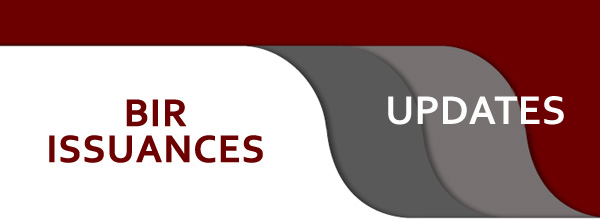
Revenue Memorandum Circular No. 102-2022 dated July 14, 2022
This publishes Fiscal Incentives Review Board Resolution No. 017-22 - grant of authority to implement a 70:30 Work-From-Home arrangement for Registered Business Enterprises in the Information Technology – Business Process Management Sector.
This publishes Fiscal Incentives Review Board Resolution No. 017-22 regarding the grant of authority to implement a 70:30 Work-From-Home (WFH) arrangement for Registered Business Enterprises (RBEs) in the Information Technology – Business Process Management (IT-BPM) Sector.
The number of employees under a WFH arrangement shall not exceed thirty percent (30%) of the total workforce of the RBE while the remaining seventy percent (70%) of the total workforce shall render work or service within the geographical boundaries of the ecozone or freeport zone being administered by the Investment Promotion Agency with which the project/activity is registered; Provided, That the total workforce shall refer to the total employees that are directly or indirectly engaged in the registered project or activity of the RBE, but excludes third-party contractors rendering janitorial or security services and other similar services.
RBEs in the IT-BPM sector adopting a WFH arrangement exceeding the thirty percent (30%) threshold shall not be entitled to avail of fiscal and non-fiscal incentives for the said month/s of non-compliance.
The 70:30 WFH arrangement is a temporary measure granted to IT-BPM RBEs from April 1, 2022 until September 12, 2022 only under Rule 23 of the Corporate Recovery and Tax Incentives for Enterprises (CREATE) Act Implementing Rules and Regulations in view of Presidential Proclamation No. 1218, s.2021.
Revenue Memorandum Circular No. 110-2022 dated July 14, 2022
This publishes the May 30, 2022 letter from the Food and Drug Administration of the DOH endorsing updates to the List of VAT-Exempt Medicines under RA No. 11534 (CREATE Act).
This publishes the full text of the May 30, 2022 letter from Food and Drug Administration OIC Director General Oscar G. Gutierrez, Jr. endorsing updates to the “List of VAT-Exempt Medicines” under CREATE Act, which now includes certain medicines prescribed for cancer and COVID-19 treatment.
Also, as clarified under Q&A No. 1 of Revenue Memorandum Circular No. 99-2021, the effectivity of the VAT exemption of the covered medicines and medical devices under the CREATE Act shall take effect on the date of publication by the FDA of the said updates to the said list.
Revenue Memorandum Circular No. 111-2022 dated July 14, 2022
This publishes the full text of Executive Order No. 170 titled “Adoption of Digital Payments for Government Disbursements and Collections.”.
All departments, agencies, and instrumentalities of the government, including state universities and colleges, government-owned or -controlled corporations are directed, and local government units are enjoined, to adopt digital payments for their respective disbursements and collections.
All Covered Agencies shall utilize safe and efficient digital disbursement in the
payment of goods, services and other disbursements, including in the distribution of financial assistance, as well as in the payment of salaries, wages, allowances and other compensation to employees.
Covered Agencies shall be allowed to disburse funds directly into the transaction accounts of recipients or beneficiaries, whether held in government or private financial institutions, without need of a special arrangement from the financial institution concerned. For this purpose, Covered Agencies may use facilities of Government Servicing Banks, such as Advice to Debit Account or interoperable Electronic Fund Transfers.
Further, Covered Agencies shall be responsible for preparing payment instructions, with all necessary details, including the name of the beneficiary, details of the transaction account, and amount involved.
Revenue Memorandum Circular No. 112-2022 dated July 14, 2022
This publishes the June 27, 2022 letter from the Food and Drug Administration of the DOH endorsing updates to the List of VAT-Exempt Medicines under RA No. 11534 (CREATE Act).
This publishes the June 27, 2022 letter from Food and Drug Administration OIC-Director General Oscar G. Gutierrez, Jr. endorsing updates to the “List of VAT-Exempt Medicines” under CREATE Act, which now includes certain medicines prescribed for tuberculosis and deletes medicines for COVID-19 treatment.
Also, as clarified under Q&A No. 1 of Revenue Memorandum Circular No. 99-2021, the effectivity of the VAT exemption of the covered medicines and medical devices under the CREATE Act shall take effect on the date of publication by the FDA of the said updates to the said list.
Revenue Memorandum Circular No. 113-2022 dated July 14, 2022
This publishes the July 1, 2022 letter from the Food and Drug Administration of the DOH endorsing updates to the List of VAT-Exempt Medicines under RA No. 11534 (CREATE Act).
This publishes the July 1, 2022 letter from Food and Drug Administration OIC-Director General Oscar G. Gutierrez, Jr. endorsing updates to the “List of VAT-Exempt Medicines” under CREATE Act, which deletes and corrects certain medicines prescribed for COVID-19 treatment.
Also, as clarified under Q&A No. 1 of Revenue Memorandum Circular No. 99-2021, the effectivity of the VAT exemption of the covered medicines and medical devices under the CREATE Act shall take effect on the date of publication by the FDA of the said updates to the said list.
Revenue Memorandum Circular No. 115-2022 dated July 14, 2022
This lifts the suspension on the issuance of Mission Orders for the conduct of Tax Compliance Verification Drive (TCVD).
This lifts the suspension on the issuance of Mission Orders insofar as authorizing Revenue Officers to conduct Tax Compliance Verification Drive (TCVD). This includes verification of complaints involving alleged violation of the Tax Code.
Strict compliance with the existing applicable Rules and Regulations of the BIR on the issuance and implementation of such Mission Orders shall be observed. The issuance of Mission Orders other than for TCVD purposes shall remain suspended until further notice.
Revenue Delegation Authority Order No. 7-2022 dated July 14, 2022
This amends Revenue Delegation Authority Order No. 4-2018, Relative to the Delegation of Authority to Sign and Approve Assessment Notices & Reports of lnvestigation of the Divisions under the Large Taxpayers Service (LTS).
This amends Revenue Delegation Authority Order (RDAO) No. 4-2018 relative to the delegation of authority to sign and approve Assessment Notices and reports of investigation of the divisions under the Large Taxpayers Service (LTS).
Under RDAO No. 4-2018 dated April 30, 2018, the authority of the Commissioner to sign Final Assessment Notices (FAN) and Formal Letters of Demand (FLD) was further delegated to the Deputy Commissioner of Operations. This delegated authority, particularly the signing of the FAN and FLD is being repealed and reverted to the Assistant Commissioner of the LTS or, in his/her absence, the concerned Head Revenue Executive Assistant (HREA) at the LTS, as previously provided under RDAO No. 7-2007 dated August 13, 2007. However, the authority to sign and approve Final Decisions on Disputed Assessments (FDDA) remains under the authority of the Commissioner of Internal Revenue.
BIR Ruling NSH-351-2022 dated July 14, 2022
The process of converting renewable sources into power is a continuing process and may continue even during the commercial operations as long as there is a renewable energy being converted into power. Necessarily, local purchases incurred during this stage remains to be entitled to VAT zero-rating.
Certain local suppliers charge 12% VAT to the Companies on the basis that the BIR Rulings do not explicitly state that the goods and services supplied to the Companies during the commercial operations of their renewable energy (RE) projects are VAT zero-rated.
RA No. 9513 divides RE Contracts into 2 stages - pre development stage and the development/commercial stage – and the VAT zero-rating incentive under Section 15(g) applies to the entirety of the development/commercial stage, which may include commercial operations. The law expressly provides that the incentive shall also apply to the whole process of exploring and developing renewable energy sources up to its conversion into power. It must be noted that the process of converting renewable sources into power is a continuing process and may continue even during the commercial operations as long as there is a renewable energy being converted into power. Necessarily, local purchases incurred during this stage remains to be entitled to VAT zero-rating.
The VAT zero-rating granted to the Companies under Section 15(g) of RA 9513 applies to the local purchases of goods, properties and services needed during the development, construction and installation of plant facilities, and during the whole process of exploration and development of RE sources up to its conversion into power i.e., the entire development/commercial stage, which may include commercial operations.
BIR Ruling NSH-352-2022 dated July 14, 2022
A homeowner association is not among those in whose favor donation or gifts made are exempt under the law.
The request for a tax exemption ruling relating to the donation made by Mr. Agustin V. Lising to Mariquita V. Lising Homeowners Association, Inc. (MVLHAI) on July 9, 2010 of a property located in Barrio of Mahayag, Davao City was denied for lack of legal basis.
The BIR held that a homeowner association like MVLHAI is not among those in whose favor donation or gifts made are exempt under the law. Gifts, donations, and other contributions received by associations are not qualified for exemption under Section 101 (A) (2) of the tax code, consequently, such transactions are subject to donor’s tax pursuant to Section 98 and 99 of the Tax Code.
Considering that tax exemption cannot be created by implication because exemptions from taxation are highly disfavored in law and one who claims exemption from tax must be able to justify his claim by clearest grant of organic or statute law.
BIR Ruling No. OT-353-2022 dated July 19, 2022
The taxpayer and the Commissioner may agree on the estimated useful life and rate of depreciation of any property.
The request for confirmation on the proposed change in accounting treatment for bottles and cases of Coca-Cola FEMSA Philippines, Inc. (CCFPI) in claiming depreciation, both for tax and financial accounting purposes was confirmed by the BIR.
With the change of ownership of the CCFPI, it needs to align the accounting treatments of its assets in accordance with the accounting treatment per Coca-Cola FEMSA, S.A.B. de C.V. policy.
The BIR held that the taxpayer and the Commissioner may agree on the estimated useful life and rate of depreciation of any property. The rate so agreed upon shall be binding on both the taxpayer and the BIR. However, if it develops that the useful life of the property originally estimated under previous factual conditions is no longer reasonable, the law allows the taxpayer to lengthen or shorten the useful life of the property in the light of the prevailing factual considerations.

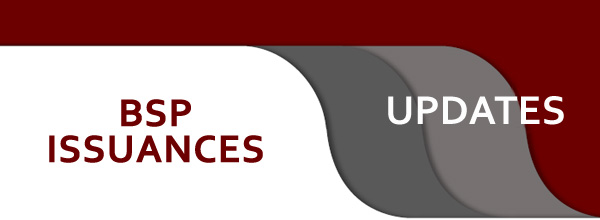
BSP Circular Letter No. CL-2022-054 dated July 8, 2022
This provides the Financial Action Task Force (FATF) publications on High Risk and Other Monitored Jurisdictions for June 2022.
This is to inform all BSP-Supervised Financial Institutions (BSFIs) of the updated statements of the FATF issued on 17 June 2022 on high-risk jurisdictions subject to a call for action as well as jurisdictions under increased monitoring:
1. High Risk Jurisdictions subject to a Call for Action – BSFIs should refer to the FATF statement on these jurisdictions adopted on 21 February 2020, which was previously disseminated by the BSP thru various CLs, the latest of which was CL-2022-026.
In addition, BSFIs should take necessary actions (such as immediate freezing and filing of returns) required under relevant issuances on TFS in case of funds or property, including related accounts, of the designated individuals and entities referred to in all applicable UNSC and AMLC Resolutions.
2. Jurisdictions under Increased Monitoring – The FATF has issued an updated list of jurisdictions under increased monitoring or with strategic deficiencies. The FATF does not call for the application of enhanced due diligence (EDD) measures on these jurisdictions but encourages its members and all jurisdictions to take into account the information presented in their risk analysis.
BSP Circular Letter No. CL-2022-056 dated July 13, 2022
This provides for the call to all banks for the publication / posting of Balance Sheet (BS) and Consolidated Balance Sheet (CBS).
A call is hereby made for the publication/posting by your bank of its Balance Sheet (Head Office, branches, and other offices) together with its Consolidated Balance Sheet (banks and its subsidiaries and affiliates), if applicable, as of 30 June 2022, in accordance with Section 175 of the Manual of Regulations for Banks (MORB) and Memorandum No. M-2020-073 dated 25 September 2020.
BSP Circular Letter No. CL-2022-057 dated July 13, 2022
This provides for the call to all trust corporations for the publication /posting of Balance Sheet (BS) and Consolidated Balance Sheet (CBS).
A call is hereby made for the publication by your institution of its Balance Sheet (Head Office, branches/other offices), as of 30 June 2022, in accordance with Section 183-T of the Manual of Regulations for Non-Bank Financial Institutions (MORNBFI) and Memorandum No. M-2017-027 dated 11 September 2017.
BSP Circular Letter No. CL-2022-058 dated July 13, 2022
This provides for the call to all non-bank financial institutions with quasi-banking functions and/or trust authority of the publication/posting of Statement of Condition and/or Consolidated Statement of Condition.
A call is hereby made for the publication by Non-Bank Financial Institutions with Quasi-Banking Functions and/or Trust Authority of its Statement of Condition (Head Office, branches and other offices) side-by-side with its Consolidated Statement of Condition (parent institution and its subsidiaries and affiliates), if applicable, as of 30 June 2022, in accordance with Section 172-Q of the Manual of Regulations for Non-Bank Financial Institutions (MORNBFI) for quasi-banks and Section 144-N of MORNBFI for trust entities.
Such Statement of Condition and Consolidated Statement of Condition, where applicable, shall be published in a newspaper of general circulation in the city/province where the principal office is located, but if no newspaper is published in the same city/province, then in a newspaper published in Metro Manila or in the nearest city/province within twenty (20) working days from the date of this Circular Letter.
The original and a copy of the Statement of Condition and/or Consolidated Statement of Condition, where applicable, shall be scanned and submitted in pdf format within twenty (20) working days from the date of this Circular Letter at This email address is being protected from spambots. You need JavaScript enabled to view it. in accordance with Memorandum No. M-2021-036 dated 28 June 2021.

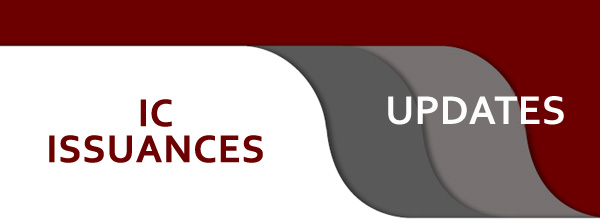
IC Advisory No. RS-2022-30 dated July 25, 2022
This reminds on submission of the Catastrophe/Property Insurance Reports.
Pursuant to IC Circular No. 2020-75 on Catastrophe/Property Insurance Reports (DRFI), all regulated non-life insurance companies are mandated to fill out the Annex A – Property Insurance Policy Database and Annex B – Property Insurance Incurred Loss Database appropriately and completely. The required information and guidelines in filing out of the templates includes providing information based on the definition, type of field and character information as indicated in the manuals.
To give companies sufficient time to comply with this requirement, the deadline for the submission of DRFI reports covering the year 2021 is hereby extended to 31 December 2022. Nonetheless, submission for the succeeding years will still be on 31st of May
.
IC Circular Letter
CL-2022-34 dated July 14, 2022
This provides the guidelines on the adoption of the revised scheduled of minimum catastrophe rates.
The revised schedule of minimum catastrophe rates prescribed under this Circular Letter shall be observed by all non-life insurance companies and intermediaries and shall apply to all insurance policies covering earthquake and typhoon and flood risk for both new and renewal business, except for risk under motor car tariff.
Any company found guilty of violation of this Circular Letter shall be subject to applicable fines and penalties under pertinent issuances of this Commission and Sections 372 and 438 of the Insurance Code of the Philippines, as amended by Republic Act No. 10607
.
IC Circular Letter
CL-2022-36 dated July 18, 2022
This requires the submission of status reports and additional disclosures in the financial statements relative to IFRS 17 insurance contracts.
All insurance and professional reinsurance companies and HMOs are required to submit the following reports on or before 30 April 203 and the following years thereafter.
1. A report of specific actions already taken in preparation for the IFRS 17 implementation on 01 January 2025; and
2. A report of specific actions to be taken in preparation for the IFRS 17 implementation on 01 January 2025.
The above reports shall be submitted based on the following schedules:
| Report | Submission Date |
| 1. Actions already taken as of 31 December 2022 | 30-Apr-2023 |
| 2. Actions to be taken until 31 December 2024 | |
| 1. Actions already taken as of 31 December 2023 | 30-Apr-2024 |
| 2. Actions to be taken until 31 December 2024 | |
| 1. Actions already taken as of 31 December 2024 | 30-Apr-2025 |

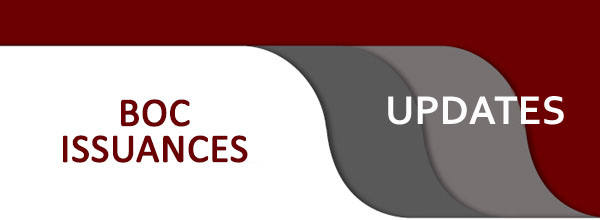
CAO No. 07-2022
This Customs Administrative Order (COA) provides for the Accreditation of Importers.
- The accreditation of the following Importers shall be governed by this CAO:
a. Other government agencies or instrumentalities;
b. Foreign embassies, consulates, legations, agencies of other foreign governments;
c. International organizations with diplomatic status and recognized by the Philippine government, including foreign workers and consultants; or
d. Foreign officials and employees of foreign embassies, legates, consular officers and other representatives of foreign governments.
- For all other types of Importers, the Bureau will issue separate guidelines for the accreditation, registration and monitoring.
- Only accredited Importers can transact with the Bureau using the Bureau's automated customs processing system.
| Validity | The customs accreditation shall be valid for a period of one (1) year from the date of its approval, unless otherwise suspended, revoked or cancelled as provided herein. |
| Automatic Renewal | The accreditation of an Importer may be automatically renewed by the Bureau for instances provided under this CAO and subject to the submission of the required documentations, as may be applicable. |
| One-time Accreditation Privilege | The Bureau may allow one-time accreditation privilege to Importers with a high level of customs compliance record under the Authorized Economic Operators (AEOs) and other trade facilitation programs. |
| Processing Fee | A Processing Fee in the amount of Php2,000.00 shall be required for new application or renewal of accreditation. |
- This CAO provides for the following:
- Application Process for First Time or New Applicants (Section 5)
- Application Process for Renewal of Accreditation (Section 6)
- Bureau of Customs’ Action on Application (Section 7)
- Responsibilities of the Importer in Relation to its Acccreditation (Section 8)
- Responsibilities of the Accredited Importer in Relation to Goods Declaration (Section 9)
- Responsibilities of the Accredited Importer for Payment of all Duties, Taxes, and Other Charges due on the Imported Goods (Section 10)
- Responsibilities of the Accredited Importer for Post-Clearance Audit Purposes (Section 11)
- Responsibilities of the Accredited Importer to Coopeate in the Enforcement of the CMTA (Section 12)
Penalties (Section 13)
CMO No. 19-2022 dated July 5, 2022
This provides for the implementation of the Electronic Zone Transfer System (E-ZTS) for the Inter-Zone Transfer of Goods Between PEZA-Registered Enterprises (PREs).
This order aims to:
1. Automate the BOC-PEZA operations governing inter-zone transfers and the Bring-In and Bring-Out of goods to/from the PEZA economic zones to other PEZA economic zones pursuant to Section 4.3.2 of CAO No. 11-2019, BOC-PEZA JMO No. 2-2015 dated July 2015 and 2018 MOA between BOC and PEZA;
2. Provide guidelines and institute measures to safeguard the transfer of goods from one PEZA zone to another PEZA zone;
3. Improve the competitiveness of enterprises doing business in the global best practices; and
4. Clearly define the duties and responsibilities of Customs Personnel in the transfer of goods from Ecozone Export Enterprise (EEE) or other EEE Facilities or Ecozone Logistics Service Enterprise (ELSE) Locators.
As such, this provides the guidelines on the following:
1. Posting of the General Transport Surety Bond (GTSB);
2. Filing and approval of the GTBS;
3. Examination of goods for transfer; and
4. Monitoring of transfer.

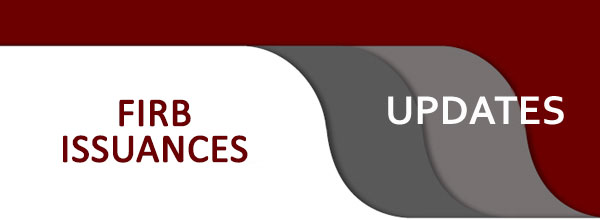
FIRB Resolution No. 020-22 dated June 21, 2022
This provides for the extension of the deadline for submission of the Annual Tax Incentive Report (ATIR) and Annual Benefits Report (ABR) for all Registered Business Enterprises (RBEs) and Investment Promotion Agencies (IPAs).
This provides for the extension of the deadline for submission of the Annual Tax Incentive Report (ATIR) and Annual Benefits Report (ABR) of all registered business enterprises (RBEs) to July 15, 2022 and the deadline for submission of ATIR of investment promotion agencies (IPAs) to August 15, 2022 without the imposition of the penalty under Section 308 of the Tax Code, as amended by CREATE Act.

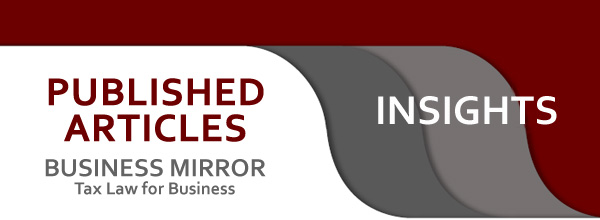
180-Day Period on Tax Assessment
By Atty. Fulvio D. Dawilan
Among the due process requirements in a tax assessment process is the issuance of a formal letter of demand and assessment notice, with all the necessary information indicated in the said notice and properly issued to the taxpayer. A taxpayer who does not agree with the assessment may file a protest within 30 days following the receipt of the same. The protest may be in the form of request for reconsideration if the plea is based on existing records without the need of additional evidence. On the other hand, if the protest calls for the re-evaluation of the assessment on the basis of newly discovered or additional evidence that a taxpayer intends to present, the protest shall be in the form of a request for re-investigation. The supporting documents should also be submitted within 60 days from the filing of the request for re-investigation.
In case of a denial of the protest, the taxpayer may appeal to the Court of Tax Appeals (CTA) or file an appeal with the office of the Commissioner of Internal Revenue (CIR). Either remedy should be filed within 30 days from the receipt of the decision. Appeal to the CIR is available only if the denial is issued by an authorized representative of the Commissioner. If the denial is issued by the CIR, the remedy should be a direct appeal to the CTA.
There are instances, however, where the protest is not acted upon. If this happens, are there remedies available for the taxpayer other than awaiting the decision? If no action is made within one hundred eighty (180) days from the date of filing of the protest, in case of a request for reconsideration, or from the submission of complete documents, in case of request for re-investigation, the taxpayer can opt to already appeal to the CTA within 30 days from the lapse of the 180-day period.
There is only one 180-day period, that is, the period counted from the filing of the protest or the submission of the required documents. Accordingly, if an authorized representative of the CIR denies the protest within the 180-day period and the taxpayer appeals to the CIR, the CIR has the remaining of the 180 days within which to act. And if there is no action, the taxpayer may appeal to the CTA within 30 days after the lapse of the said remaining period. No new 180-day period is created when a taxpayer files and appeal to the CIR.
It follows that if the taxpayer waits for the decision of the CIR’s representative and the same is issued after the lapse of the 180-day period, the same may be appealed to the CTA or to the CIR. In case of the latter, the 180-day period is no longer a consideration and the only remedy for the taxpayer is to wait for the CIR’s decision before making an appeal, if the same is not favorable.
In essence, there is no new or separate 180-day period that will start to run when the taxpayer appeals to the CIR. A taxpayer does not have the option to appeal to the CTA, if no action is made by the CIR after the lapse of 180 days from the filing of the appeal. If the taxpayer considers that as a remedy, that should always be counted from the filing of the protest or submission of the documents in support of the protest. This was the pronouncement of the Supreme Court in G.R. No. 258101, affirming the decision of the CTA.
Incidentally, when a final decision on disputed assessment is elevated to the CIR, it does not become final, executory and demandable. Accordingly, the issuance of collection letters, final notice before seizure, warrant of distraint and levy and any enforcement action, pending the appeal before ethe CIR, are considered void. They do not emanate from demandable assessment and there are no delinquent taxes to speak of. This was the recent pronouncement of the Supreme Court in G.R. No. 231238, June 20, 2022.
Appeal to the CTA or the CIR does not necessarily require a decision on the protest or appeal. This can be done even if there is inaction on the part of the tax authority, as an option to awaiting the issuance of a decision. In the words of the Courts, this option is granted to empower the taxpayers who are usually held hostage by the CIR’s inaction on their protests. It should indeed empower taxpayers but only if the timing for its use is properly observed.
----------------------------------------------
For inquiries on the article, you may call or email
ATTY. FULVIO DAWILAN
Managing Partner
T: +63 2 8403 2001 loc. 310
This email address is being protected from spambots. You need JavaScript enabled to view it.



DISCLAIMER: The contents of this Insights are summaries of selected issuances from various government agencies, Court decisions and articles written by our experts. They are intended for guidance only and as such should not be regarded as a substitute for professional advice.
Copyright © 2022 by Du-Baladad and Associates (BDB Law). All rights reserved. No part of this issue covered by this copyright may be produced and/or used in any form or by any means – graphic, electronic and mechanical without the written permission of the publisher.





